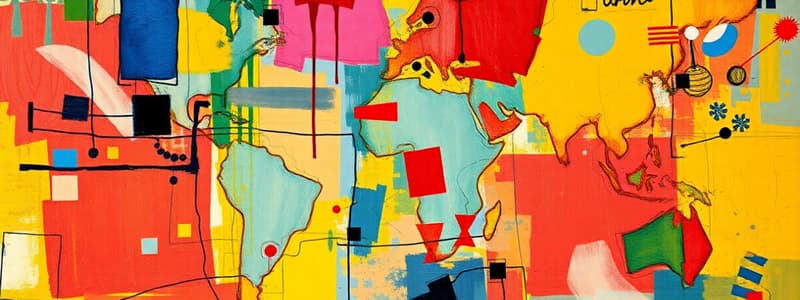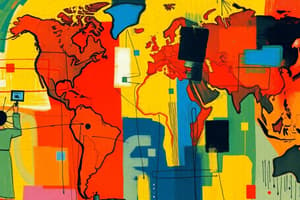Podcast
Questions and Answers
In the context of global media culture, what does 'media' primarily refer to?
In the context of global media culture, what does 'media' primarily refer to?
- The artistic expressions of a society, such as paintings and sculptures.
- Communication channels for disseminating information, music, education, and promotional messages. (correct)
- The sum total of a population's arts, beliefs, and institutions passed down through generations.
- Physical infrastructure like telephone poles and broadcast towers.
How does the concept of 'culture' relate to the study of global media?
How does the concept of 'culture' relate to the study of global media?
- It refers solely to the political systems that govern media outlets.
- It encompasses the ways of life, beliefs, and institutions of a population, which media both reflects and influences. (correct)
- It describes the economic models used to fund media production.
- It's unrelated, as culture is static and media is constantly evolving.
What is the role of media in the context of globalization?
What is the role of media in the context of globalization?
- Media acts as the main vehicle for spreading global culture and ideas. (correct)
- Media slows globalization by emphasizing local news and entertainment.
- Media helps to preserve traditional cultures by limiting outside influence.
- Media has no significant impact on globalization because it’s primarily a source of entertainment.
Which of the following is an example of broadcast media?
Which of the following is an example of broadcast media?
How does digital media differ from print and broadcast media?
How does digital media differ from print and broadcast media?
In Lule's proposed five time periods of media development, which stage comes directly before the Electronic Media era?
In Lule's proposed five time periods of media development, which stage comes directly before the Electronic Media era?
What is the significance of oral communication in the history of media?
What is the significance of oral communication in the history of media?
How did the invention of script impact human communication?
How did the invention of script impact human communication?
What key advancement did the printing press bring to media and communication?
What key advancement did the printing press bring to media and communication?
Which characteristic defines electronic media?
Which characteristic defines electronic media?
How have digital media platforms changed daily life?
How have digital media platforms changed daily life?
What defines a global product?
What defines a global product?
What do local cultural products represent?
What do local cultural products represent?
According to Pieterse (2014), what are the primary outcomes of globalization’s influence on culture?
According to Pieterse (2014), what are the primary outcomes of globalization’s influence on culture?
What is cultural differentialism?
What is cultural differentialism?
What does cultural hybridization suggest?
What does cultural hybridization suggest?
What is 'glocalization' in the context of cultural hybridization?
What is 'glocalization' in the context of cultural hybridization?
What does cultural convergence suggest about globalization?
What does cultural convergence suggest about globalization?
Which of the following examples best illustrates cultural convergence?
Which of the following examples best illustrates cultural convergence?
How do economics and technology facilitate the spread of cultural convergence?
How do economics and technology facilitate the spread of cultural convergence?
Flashcards
Media
Media
Communication channels for disseminating news, music, movies, education, and promotional messages.
Culture
Culture
Ways of life including arts, beliefs, and institutions passed down through generations.
Globalization
Globalization
The spread of various cultures, ideas, relying on media as a main conduit.
Print Media
Print Media
Signup and view all the flashcards
Broadcast Media
Broadcast Media
Signup and view all the flashcards
Digital Media
Digital Media
Signup and view all the flashcards
Oral Communication
Oral Communication
Signup and view all the flashcards
Script
Script
Signup and view all the flashcards
Printing Press
Printing Press
Signup and view all the flashcards
Electronic Media
Electronic Media
Signup and view all the flashcards
Digital Media
Digital Media
Signup and view all the flashcards
Global Product
Global Product
Signup and view all the flashcards
Local Cultural Products
Local Cultural Products
Signup and view all the flashcards
Media's Role
Media's Role
Signup and view all the flashcards
Cultural Differentialism
Cultural Differentialism
Signup and view all the flashcards
Cultural Hybridization
Cultural Hybridization
Signup and view all the flashcards
Cultural Convergence
Cultural Convergence
Signup and view all the flashcards
Study Notes
Global Media Culture
- Global media culture is a contemporary world issue.
Media
- Media refers to communication channels used to disseminate news, music, movies, education, promotional messages, and other data.
Culture
- Culture is defined as all ways of life, including arts, beliefs, and institutions of a population passed down through generations.
Global Media Cultures
- Globalization spreads various cultures and ideas.
- Media is the main conduit for spreading global culture and ideas.
Forms of Media
- Print media consists of paper and ink, reproduced mechanically (newspapers, books, magazines, comics, brochures).
- Broadcast media uses airwaves to reach target audiences (television, radio, satellites, mobile phones, movies/films).
- Digital media consists of content organized and distributed on digital platforms (internet, social media, computers).
Proposed Five Time Periods By Lule
- Historically, media has undergone five stages of development.
- The five stages are:
- Oral communication.
- Script.
- Printing Press.
- Electronic Media.
- Digital Media.
Oral Communication
- Oral communication is the oldest media form used by mankind for at least 200,000 years.
- Language allowed humans to communicate and share information.
Script
- The invention of script allowed humans to communicate over larger spaces and for longer durations.
Printing Press
- Printing press allowed the continuous production, reproduction, and circulation of print materials.
Electronic Media
- Electronic media used electricity.
- Electronic media includes telegraph, telephone, film, radio, television.
Digital Media
- Daily lives are revolutionized by digital media.
- People adapt to new practices like fashion, sports, music, and food through information provided by computers.
- Ideas are exchanged, and relationships/linkages are established through platforms like Skype, Google, and Zoom.
Dynamics of Local and Global Culture
- Global products are marketed internationally under the same brand name, features, and specifications.
Local Cultural Products
- Local cultural products include goods and services such as arts, literature, architecture, museums, movies, and music.
- Local cultural products showcase the history and information belonging to a country's cultural heritage.
Global Culture and Media
- Media is a carrier of culture and a tool for interaction between people with different cultures.
- Pieterse (2014) claims the only outcomes of globalization's influence on culture are cultural differentialism, cultural convergence, and cultural hybridity.
Cultural Differentialism
- Cultural differentialism emphasizes that cultures are essentially different and only superficially affected by global flows, viewing cultural difference as immutable.
- Different religions have distinct beliefs, practices, and rituals valued by their followers, such as variations in prayer, fasting, or celebrations.
Cultural Hybridization
- Cultural hybridization suggests that globalization leads to increasing and ongoing mixing of cultures through the integration of local and global elements.
- "Glocalization" is a key concept. It refers to the interpenetration of the global and local, resulting in unique outcomes in different geographic areas.
Cultural Convergence
- Cultural convergence suggests that globalization engenders a growing sameness of cultures.
- An example is the global spread of English as a primary language of communication, facilitated by economic and technological advancements, and the adoption of American fast-food chains globally with local flavor adaptations.
Studying That Suits You
Use AI to generate personalized quizzes and flashcards to suit your learning preferences.




